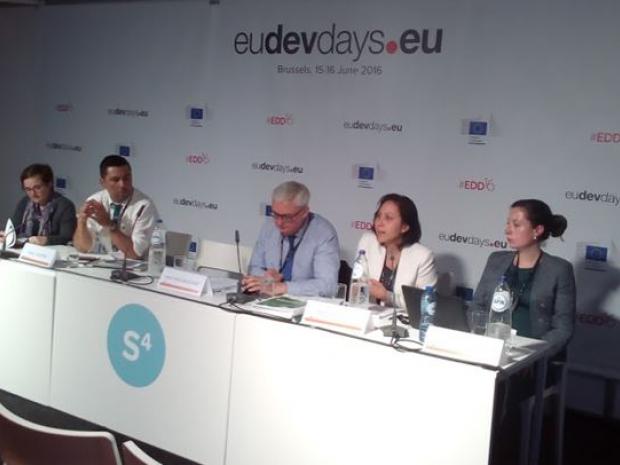Ecosystem-based approaches to disaster risk reduction and climate change adaptation
Discussion details

Marisol Estrella, Programme Coordinator for UNEP’s Office for Disaster Risk Reduction, participated in a session at the European Development Days on 15 June 2016, entitled “Ecosystem-based approaches to disaster risk reduction and climate change adaptation”.
The other high-level panellists were Peter Craig-McQuaide (moderator), Head of Unit at European Commission DG DEVCO, Oscar J. Guevara, Climate Change Adaptation Specialist at WWF Colombia, Bambi Semroc, Senior Strategic Advisor at Conservation International, and Katherine Cronnin from Deltares.
Disasters, which are on the rise across the world, lead to loss of human lives and massive economic damage. There is an increasing realization that these disasters are exacerbated by environmental degradation and climate change. Ecosystem-based approaches to disaster risk reduction and climate change adaptation offer integrated solutions to these global challenges.
This session looked at specific pilot demonstration projects across the world. Fore example, in many areas in the Democratic Republic of Congo deforestation has led to heavy sedimentation, greater flood risks and gully erosion. A UNEP pilot project with support from the European Commission demonstrated that river-based management can actually work and provided a plan for the government to address these challenges.
Conservation International in turn have worked on ecosystem-based solutions for coffee producers, like introducing agroforestry strategies to make coffee production more sustainable and protect biodiversity.
Close involvement of local stakeholders was seen as an important element of climate adaptations approaches and strategies. This point was illustrated by some project examples of WWF and Deltares.
It was agreed that disaster risk reduction strategies and must attract more investments. Mainstreaming such approaches is also necessary, almost every policy can be made climate smart.
Following the panel debate the panellists took questions from the floor. They discussed the importance of scaling up the successful pilot projects while also emphasizing the importance of cost-benefit analyses to provide an evidence base of added value for such projects. Lastly, the sustainability of interventions was sees as key, and that the development of robust M&E frameworks to track results and impacts must not be overlooked as well.
For more information, including photos and audio recording of the session see here.
Log in with your EU Login account to post or comment on the platform.